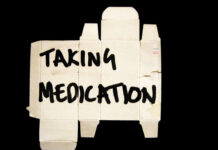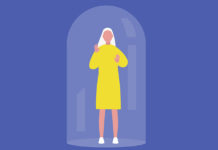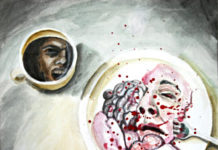Researchers Search for Subgroups Where Antidepressants Are More Effective
The researchers theorized that this increased effectiveness was due not to “antidepressant” properties, but rather to the drug’s side effects, which include insomnia, drowsiness, and nausea.
Researchers Test Harms and Benefits of Long Term Antipsychotic Use
Researchers from the City College of New York and Columbia University published a study this month testing the hypothesis that people diagnosed with schizophrenia treated long-term with antipsychotic drugs have worse outcomes than patients with no exposure to these drugs. They concluded that there is not a sufficient evidence base for the standard practice of long-term use of antipsychotic medications.
Scientists Clarify Risks of Augmenting with Antipsychotic Medications for Depression
The researchers found that while antipsychotic drugs may be slightly more effective than alternative antidepressants, they come with a much higher side effect burden.
Withdrawing From Psychiatric Drugs: What Psychiatrists Don’t Learn
“What I’d really like to do is stop everything,” I say. The reality is that psychiatrists are not the experts when it comes to getting people off psychiatric drugs.
Use of Antidepressants Linked to Diabetes
Selective serotonin reuptake inhibitors (such as Prozac and Zoloft) are the most commonly prescribed medication for depression. SSRIs have long been associated with an...
Danish Study Finds Better 10-year Outcomes in Patients Off Antipsychotics
Study finds that 74% of patients with a psychotic disorder off antipsychotics at end of 10 years are in remission.
The MD and the Imaginary Eating Disorder
He could have asked me if there was a specific event that had precipitated my suicide attempt. He could have asked if I had a history of trauma. He could have simply asked, “What happened?” “What are you feeling?” or “So what’s going on?” Nope. He chose to open our meeting with an accusatory remark about a make-believe eating disorder.
Mental Health Services Turned My Daughter’s Crisis into a Way of Life
My world turned upside down when my daughter nearly died from a serious suicide attempt. After several years as her caretaker I began to wonder: What can we do to change the way our mental health services are organized so they won't turn a crisis into a way of life for already distressed and vulnerable people?
Everything Matters: a Memoir From Before, During and After Psychiatric Drugs
Psych meds can not only put weight on regardless of how you otherwise care for yourself, they also tend to make people feel gravely lethargic and vaguely sick all the time. I could not exercise as I had before. Could not. It doesn't matter how much mental health professionals try to tell us that if we just exercised we'd be okay in the face of neurotoxic drugs that cause weight gain, because the fact is the drugs impede that capacity. This is not widely appreciated or understood and people on psych meds are again traumatized and made to feel guilty for something that is truly outside of their control as long as they are taking these medications.
Study Shows Success With Reduced Antipsychotic Use
People who reduced antipsychotic use by tapering were doing just as well after five years as those who continued using the drugs.
The Astonishing Zyprexa Cover-Up
Back in 2006, when my son Franklin was in his late twenties and living in a group home in the Boston area, he refused to take Clozaril any more because of the required bi-weekly blood draws. His doctor prescribed Zyprexa as a substitute, and Frank suddenly began to gain weight ... a lot of weight. Later, I would learn that UCLA psychiatrist Dr. William Wirshing had said of Zyprexa prior to its 1996 approval by the FDA: “It is just un-stinkin’-believable. It is the best drug for gaining weight I’ve ever seen.” The doctor indicated that taking ten milligrams of the medication was equivalent to ingesting 1,500 extra calories per day. My outrage knew no bounds.
Stimulant Medication Use Linked to Sharp Increase in BMI by Eighth Grade
New evidence suggests that children on ADHD medication may have stunted growth initially but more rapid increases in body mass over time.
In Chronic Patients, Antipsychotics Have Limited Efficacy in Reducing Symptoms
A large review and meta-analysis of 167 studies across 60 years dissects placebo-controlled randomized controlled trials of antipsychotic drugs.
Mental Health Disability Claims Continue to Climb
According to new research by Joanna Moncrieff and Sebastião Viola, mental health problems have become the leading cause of disability claims in the UK. While the overall number of claims for other conditions has decreased by 35%, claims related to “mental disorders” have increased 103% since 1995.
Our Movement Needs an Alternative to the “Alternatives” Conference
A few weeks ago I saw for the first time the powerful movie “12 Years A Slave,” based on the memoir by Solomon Northup, a free black man in the 1840’s who was kidnapped and sold into slavery. It is a hard film to experience. But as I watched the scenes of unending brutality and humiliation, somehow I felt calm and almost comforted. I identified with the men and women who were treated as animals and property, to be abused and tortured just as I was as a child. But I knew that eventually the atrocity in the movie ended, and slavery was abolished.
Inappropriate Use of Antipsychotics on Adults with Intellectual and Developmental Disabilities
One-third of adults with an intellectual or developmental disability are dispensed antipsychotics, despite having no existing psychiatric diagnosis.
Experts Decry Dangerous Use of Antipsychotics in Children
In a featured article for Psychiatric Services, psychiatrists from Dartmouth raise the alarm on the increasing numbers of children prescribed dangerous antipsychotic drugs. Despite the fact that data on the safety of long-term use of these drugs in this vulnerable population “do not exist,” the rate of children and adolescents being prescribed antipsychotic drugs have continued to increase over the past fifteen years.
What’s the Harm in Taking an Antidepressant?
We know that all drugs have side effects. That’s just part of the deal right? But is it really possible that an antidepressant can cause a sane person to act like a cold-blooded criminal?
A Mental Patient’s View of the Body
In 20 years of inpatient hospitalization, the psychiatrists that I encountered focused almost exclusively on treating my diseased mind and had no concept or interest in the body. While the wheels of “progress” turn slowly in mental health, I hope that along with ongoing advocacy there will be a focus on responsible health counseling and supporting people in healthier eating and living.
Meta-Analysis Finds Exercise Improves Cognition in Individuals with Schizophrenia
A new review, published in Schizophrenia Bulletin, examines the effects of exercise on cognition in individuals diagnosed with 'schizophrenia.' The results of the meta-analysis...
Review Links Antipsychotics with Risk for Heart Attacks
A systematic review published this week in the British Journal of Clinical Pharmacology found that patients taking antipsychotic drugs were at nearly twice the risk...
$8 Million Awarded to Family Of Man Who Died in Risperdal Trial
A California jury ruled that Johnson & Johnson’s Janssen Pharmaceutical and a psychiatrist were responsible for the death of 25-year-old Leo Liu. During a clinical trial for Risperdal, Liu died of a heart injury that was “further complicated” by the drug and ignored by the study doctors. Janssen was found 70% responsible for Liu’s death and ordered to pay $5.6 million to the family.
Sexual Dysfunction from Antipsychotics Common — But Poorly Monitored by Physicians
Describing the prevalence and management of adverse effects from antipsychotics as "a neglected area" of study, a team of researchers from the UK has published a systematic review in the Journal of Psychopharmacology. They aimed to identify the prevalence of, and management strategies for nine categories of adverse effects, including sedation, weight gain, metabolic syndrome, sexual dysfunction and cardiovascular effects.
Foster Youths Meet Psychiatry: First – Do No pHarm
When a foster youth encounters a Psychiatrist, chances are high that s/he will get medicated. Traumatized foster youth are often prescribed powerful psychotropics due to exhibiting a wide variety of “normal reactions to abnormal events,” such as despair, agitation, anxiety and self-harm. The practice has been well documented; foster children are prescribed psychotropics at a 2.7 to 4.5 times higher rate than non-foster youth. The National Center for Youth Law aptly summarizes the problem as; too many (25% of foster youth medicated), too soon (300 children under the age of 5 in California are given psychotropics annually) too much (adult dosages) and for too long (no planning or reviews for possible discontinuation).
Mental Health Nurses Do Not Routinely Assess for Effects of Antipsychotic Medications
Researchers believe that side-effect monitoring is critical because of the increase in the use of antipsychotics
























